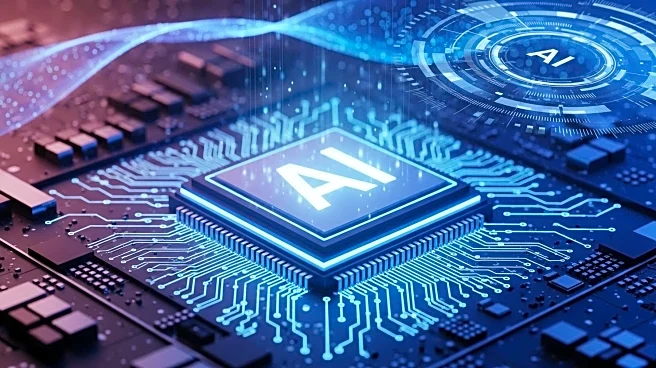What's Happening?
OpenAI has entered into a significant agreement with Korean memory chip manufacturers SK Hynix and Samsung, securing a deal valued at over 100 trillion Korean won (approximately $71.3 billion). This partnership is part of OpenAI's ambitious $400 billion Stargate AI infrastructure project, which aims to enhance the supply of high-bandwidth memory (HBM) chips crucial for next-generation AI applications. The agreement will see the production of 900,000 DRAM wafer starts per month, more than doubling the current global HBM capacity. This move positions Samsung and SK Hynix as pivotal players in the global AI infrastructure landscape and supports South Korea's goal to become a leading AI nation. The announcement has positively impacted the stock market, with SK Hynix shares rising by 12% and Samsung Electronics gaining 3.5%.
Why It's Important?
This deal underscores the growing demand for advanced memory chips driven by the expansion of AI technologies. For the U.S., this development highlights the increasing interdependence between American tech companies and international semiconductor manufacturers. The partnership not only boosts the global standing of Korean chipmakers but also strengthens the supply chain for AI infrastructure, which is critical for the continued growth of AI applications. The economic implications are significant, as the deal is expected to drive further investments and innovations in the semiconductor industry, potentially influencing global market dynamics and technological advancements.
What's Next?
Following the signing of the supply deals, OpenAI CEO Sam Altman has engaged in discussions with other major players in the semiconductor industry, including TSMC and Foxconn in Taipei. These meetings suggest potential future collaborations that could further expand OpenAI's AI infrastructure capabilities. Additionally, OpenAI's recent investment partnership with Nvidia, which involves a commitment to deploy up to 10GW in data center chips, indicates a strategic focus on enhancing data center capacities. The ongoing developments in AI infrastructure are likely to attract further investments and partnerships, shaping the future landscape of AI technology.
Beyond the Headlines
The strategic partnerships and investments in AI infrastructure highlight the ethical and economic considerations of AI development. As AI technologies become more integrated into various sectors, issues such as data privacy, security, and the ethical use of AI will become increasingly prominent. The collaboration between OpenAI and international chipmakers also reflects the geopolitical dimensions of technology development, where countries and companies vie for leadership in AI capabilities. These developments could lead to shifts in global power dynamics, with technology playing a central role in economic and political strategies.










